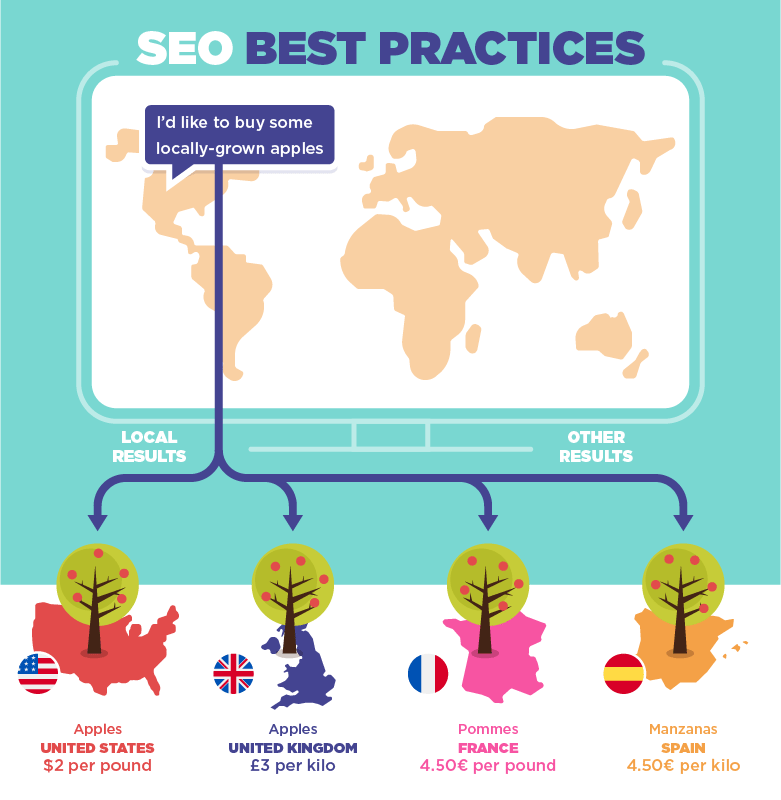Navigating the Digital Landscape: Leveraging International SEO for Cross-Border Success
In today's interconnected digital world, organizations are significantly looking past borders to take advantage of international markets. Leveraging seo (SEARCH ENGINE OPTIMIZATION) methods customized for global target markets is important for accomplishing cross-border success. The intricacy of navigating the digital landscape on a global scale demands a nuanced technique, from understanding the fundamentals of International SEO to applying geotargeting and multilingual key phrase strategies. As business make every effort to increase their reach and visibility throughout various territories, optimizing site frameworks and monitoring cross-border performance become important elements of an effective international search engine optimization technique.
Understanding International SEO Basics
Navigating the intricacies of global search engine optimization calls for a strong grasp of essential principles to efficiently broaden on-line presence throughout borders. One vital facet of worldwide SEO is understanding the importance of localization. This involves customizing web site content to suit the linguistic, social, and business distinctions of target markets. Keyword phrases should be not only translated but additionally adapted to mirror just how customers in different areas search for info.
In addition, having a clear understanding of geo-targeting is essential. This entails showing to online search engine the details countries or areas an internet site is targeting. Carrying out hreflang tags is one method to communicate this info, making sure that the correct version of a website appears in the search engine result for an individual in a certain location.
In addition, comprehending the effect of local internet search engine and social networks systems is essential for global search engine optimization success. While Google is leading in numerous areas, countries like China have their own search engines like Baidu, needing customized strategies for each platform to make best use of on the internet exposure (International SEO).

Targeting Multilingual Keyword Phrase Techniques
Developing multilingual search phrase methods is crucial for successfully reaching diverse international audiences and making best use of online exposure throughout different linguistic areas. When targeting multilingual keyword phrase approaches, it is essential to perform extensive study to comprehend the details search terms and phrases utilized by the target market in each linguistic region. This includes not just equating keyword phrases yet also thinking about social nuances, local dialects, and search patterns special to each target market.
To produce an effective multilingual key phrase technique, it is vital to prioritize relevance and search intent. Search phrases need to straighten with the web content on the site and reverberate with the social context of the target market. Making use of devices such as Google Key Words Coordinator, SEMrush, or Ahrefs can help determine high-performing keywords in various languages and assess their search volume and competition degree.
Moreover, tracking and examining the efficiency of multilingual key phrases routinely is necessary for maximizing and improving the method with time. By continually adapting to changes in search actions and trends, businesses can boost their on-line exposure and draw in more international website traffic to their internet sites.
Implementing Geotargeting and Hreflang Tags
When intending to improve worldwide SEO methods, including geotargeting and hreflang tags is critical for maximizing site visibility across various regions. Geotargeting involves tailoring content to specific areas, making certain that individuals in different areas obtain appropriate info. By carrying out geotargeting, companies can improve their neighborhood additional reading search positions and bring in region-specific traffic.

Optimizing Website Framework for Global Presence
To further boost global SEO techniques beyond geotargeting and hreflang tags, maximizing the website framework is essential for attaining worldwide presence and taking full advantage of reach across different regions. A well-structured website not just boosts customer experience however likewise helps with online search engine crawlers in recognizing the web content and context of the website. When intending for worldwide presence, it is crucial to ensure that the website is arranged in a sensible fashion that deals with individuals from numerous countries. Executing a clear power structure with distinct classifications and subcategories can aid in boosting the website's navigating and user-friendliness.
In addition, creating language-specific subdirectories or subdomains can help online search engine deliver the best version of the web site to individuals based on their language preferences, even more boosting the total individual experience. Additionally, enhancing link frameworks to consist of relevant key words and geotargeted terms can enhance the website's visibility in different regions. By structuring the web site effectively for worldwide audiences, organizations can raise their possibilities of drawing in global traffic and increasing their reach across borders.

Surveillance and Analyzing Cross-Border Efficiency
Reliable surveillance and analyzing of cross-border efficiency is necessary for evaluating the success of global SEO approaches and recognizing chances for renovation in global reach and visibility. By closely tracking vital efficiency indications (KPIs) throughout different markets, organizations can acquire valuable understandings into the performance of their cross-border SEO efforts. Keeping track of metrics such as natural web traffic, keyword rankings, conversion rates, browse around this web-site and bounce rates can give a comprehensive sight of just how well an internet site is doing in numerous regions.
Assessing cross-border efficiency information allows companies to determine fads, patterns, and locations for optimization. By contrasting efficiency across various nations, regions, or languages, companies can identify effective methods and center material to better accommodate particular target market. In addition, keeping an eye on cross-border performance makes it possible for companies to remain nimble and receptive in the ever-evolving digital landscape. Routine evaluation of search engine optimization performance on a worldwide scale guarantees that business can adjust their techniques promptly to utilize on emerging possibilities and maintain an one-upmanship in global markets.
Conclusion
To conclude, worldwide search engine optimization plays a critical role in accomplishing cross-border success by optimizing sites for worldwide exposure, targeting multilingual keyword phrase approaches, carrying out geotargeting and hreflang tags, and checking cross-border performance. By recognizing the principles of global SEO and enhancing web site frameworks appropriately, companies can properly reach and engage with their target audiences throughout different regions and languages. This critical strategy is crucial for broadening market reach and driving online growth in today's digital landscape.